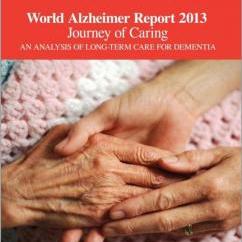
An analysis of long-term care for dementia
The World Alzheimer Report 2013 ‘Journey of Caring: An analysis of long-term care for dementia’, reveals that, as the world population ages, the traditional system of “informal” care by family, friends, and community will require much greater support. Globally, 13% of people aged 60 or over require long-term care. Between 2010 and 2050, the total number of older people with care needs will nearly treble from 101 to 277 million.
Long-term care is mainly about care for people with dementia; around half of all older people who need personal care have dementia, and 80% of older people in nursing homes are living with dementia. The worldwide cost of dementia care is currently over US$600 billion, or around 1% of global GDP.
The report which was researched and authored by Prof Martin Prince, Dr Matthew Prina and Dr Maëlenn Guerchet on behalf of the Global Observatory for Ageing and Dementia Care which is hosted at the Health Service and Population Research Department, King’s College London.
Recommendations
- Governments around the world should make dementia a priority by implementing national plans, and by initiating urgent national debates on future arrangements for long-term care
- Systems should to be in place to monitor the quality of dementia care in all settings – whether in care homes or in the community
- Autonomy and choice should be promoted at all stages of the dementia journey, prioritising the voices of people with dementia and their caregivers
- Health and social care systems should be better integrated and coordinated to meet people’s needs
- Front-line caregivers must be adequately trained and systems will need to be in place to ensure paid and unpaid carers receive appropriate financial reward in order to sustain the informal care system and improve recruitment and retention of paid carers
- Care in care homes is a preferred option for a significant minority – quality of life at home can be as good, and costs are comparable if the unpaid work of family caregivers is properly valued
- The quality of care in care homes should be monitored through the quality of life and satisfaction of their residents, in addition to routine inspections, as care homes will remain an important component of long-term care.
- Login to post comments


Recent comments
9 years 10 weeks ago
9 years 30 weeks ago
9 years 34 weeks ago
9 years 37 weeks ago
9 years 38 weeks ago
12 years 5 weeks ago
12 years 19 weeks ago
12 years 39 weeks ago